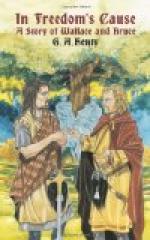He first taught his countrymen, and indeed Europe in general, that steady infantry can repel the assaults even of mailclad cavalry. The lesson was followed at Bannockburn by Bruce, who won under precisely the same circumstances as those under which Wallace had been defeated, simply because at the critical moment he had 500 horse at hand to charge the disordered mass of the English, while at Falkirk Wallace’s horse, who should have struck the blow, were galloping far away from the battlefield. Nor upon his English conquerors was the lesson lost, for at Cressy, when attacked by vastly superior numbers, Edward III dismounted his army, and ordered them to fight on foot, and the result gave a death blow to that mailed chivalry which had come to be regarded as the only force worth reckoning in a battle. The conduct of Edward to Wallace, and later to many other distinguished Scotchmen who fell into his hands, is a foul blot upon the memory of one of the greatest of the kings of England.
Edward might now well have believed that Scotland was crushed for ever. In ten years no less than twelve great armies had marched across the Border, and twice the whole country had been ravaged from sea to sea, the last time so effectually, that Edward had good ground for his belief that the land would never again raise its head from beneath his foot.
He now proceeded, as William of Normandy after Hastings had done, to settle his conquest, and appointed thirty-one commissioners, of whom twenty-one were English and ten so called Scotch, among them Sir John Menteith, to carry out his ordinances. All the places of strength were occupied by English garrisons. The high officers and a large proportion of the justiciaries and sheriffs were English, and Edward ruled Scotland from Westminster as he did England.
Among the commissioners was Robert Bruce, now through the death of his father, Lord of Annandale and Carrick; and Edward addressed a proclamation to him, headed, “To our faithful and loyal Robert de Bruce, Earl of Carrick, and all others who are in his company, greeting;” and went on to say that he possessed the king’s fullest confidence. But though Scotland lay prostrate, the spirit of resistance yet lingered in the hearts of the commonalty. Although conquered now the memory of their past success still inspired them, but until some leader presented himself none could stir. It was in August that Wallace had been executed. Archie had received several summonses from the English governors of Stirling and Lanark to come in and do homage to Edward, but he had resolutely declined, and the task of capturing his castle was too heavy a one to be undertaken by any single garrison; still he saw that the time must come, sooner or later, when he would have to choose between surrender and death. When matters settled down it was certain that a great effort would be made to root out the one recalcitrant south of the Forth. For some time he remained gloomy and thoughtful, a mood most unusual to him, and his mother, who was watching him anxiously, was scarcely surprised when one day he said to her:




